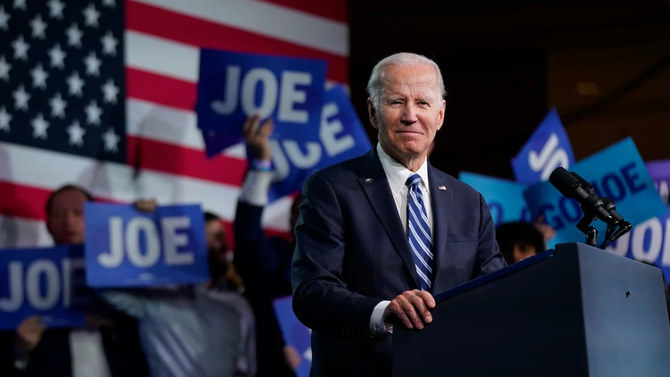Dalia Al-Aqidi
As the 2024 US presidential race is on the horizon, the Democratic National Committee finds itself facing a critical decision: Who will be its standard-bearer in the next election? The recent hint by Rep. Dean Phillips that he would seek the Democratic nomination adds a new dimension to the contest.
This development sheds some light on the internal struggles within the ranks of the Democratic Party, as the far left is looking to replace President Joe Biden, while the DNC is trying to distance itself from Robert F. Kennedy Jr., who is running for the presidential nomination against his colleague. The prospect of the party replacing the current president points to the dissatisfaction of the far left with the administration’s policies and actions.
Biden’s tenure has been marked by an expansion of government, a surge in public spending and a significant departure from conservative principles. As those on the left wing of the Democratic Party seek a more progressive candidate, they aim to push for policies such as the Green New Deal and increased government intervention in various sectors. While Biden has implemented some progressive policies, they continue to perceive him as being too moderate and compromising with the Republicans. In their view, Biden’s attempts at bipartisanship have hindered the full implementation of their ambitious agenda. Consequently, they yearn for a candidate who would be more aggressive in pushing for their vision of America’s future as a socialist country.
The apparent reluctance of the left to support Kennedy as a candidate might surprise some, given his family’s historical legacy within the party. Kennedy, the son of the iconic Sen. Robert F. Kennedy, holds a prominent position within the party. However, his political stances and controversies might have influenced the left wing’s hesitancy. His views on some issues, particularly vaccine hesitancy and environmental policies, have put him at odds with mainstream Democrats. While he might be appealing to some sections of the party, his stance on these matters has raised concerns among others. Additionally, his involvement in certain legal battles, including his efforts to challenge vaccination mandates, and his controversial statements may have contributed to the skepticism surrounding his candidacy. The DNC, including Biden, is using former President Donald Trump as a scarecrow to mobilize its base and provoke American donors to raise more funds for the Biden campaign. In the midst of the campaign video he released in April, President Biden strongly warned of the lingering menace to American democracy emanating from the specter of Trump, thus laying the groundwork for a potentially turbulent and high-stakes rematch between these two adversaries. “Every generation of Americans has faced a moment when they’ve had to defend democracy, stand up for our personal freedoms, and stand up for our right to vote and our civil rights,” Biden said.
Should Biden continue to center his campaign on the perceived threat Trump poses, it could lead to a complex scenario if the latter does not secure the Republican Party’s nomination. In such a situation, Biden’s campaign strategy might face challenges in recalibrating its message and direction. Focusing heavily on the former president as a primary target could leave Biden’s campaign vulnerable to criticism and accusations of fear-mongering or of lacking a clear vision for the future. It might also alienate potential voters who are not aligned with Trump’s policies but are also not enthusiastic about the Democratic agenda. The absence of Trump as the opponent could also affect voter enthusiasm and turnout. Trump’s presidency elicited strong emotions on both ends of the political spectrum and his candidacy could have motivated voters to rally around Biden. With a different Republican nominee, the election dynamics might change and voter enthusiasm could fluctuate.
Nevertheless, the current president has been facing challenges since his first day in office, failing to address many of them correctly. However, many American people on both sides are ready for a change, which is definitely not Vice President Kamala Harris. Biden is also facing other serious issues that he cannot ignore. His son Hunter’s legal case has been a significant discussion and controversial topic. While the full details and implications of the case are yet to unfold, it undoubtedly has the potential to impact his presidential campaign if not handled honestly and carefully.
Hunter Biden’s business dealings and allegations of ethical impropriety have been a cause for concern. The Republican Party has pointed to potential conflicts of interest and questioned whether the Biden family used their political connections for personal gain. As the legal case continues, Republicans will undoubtedly attempt to use it as a tool to undermine the president’s credibility and character. However, the impact of Hunter Biden’s legal situation on his father’s campaign depends on several factors. If the case remains isolated to his own personal actions and does not implicate the president directly, it might not significantly affect the campaign. On the other hand, any direct involvement or severe accusations against Biden could create challenges for his reelection bid.
That being said, liberal media outlets are trying to simplify and justify this legal case in an attempt to shift America’s attention while whitewashing Biden’s presidency and performance. Historically, it has not been uncommon for potential challengers from within the same party to consider running against an incumbent president, especially if there were divisions or disagreements within the party regarding policy direction or leadership. These primary challenges can serve as a way for different factions within the party to voice their concerns or advocate for different policy positions. Both parties will closely watch the Democratic primaries, eager to see how the candidate selection process unfolds and how it shapes the political landscape for the race to the White House in 2024.







